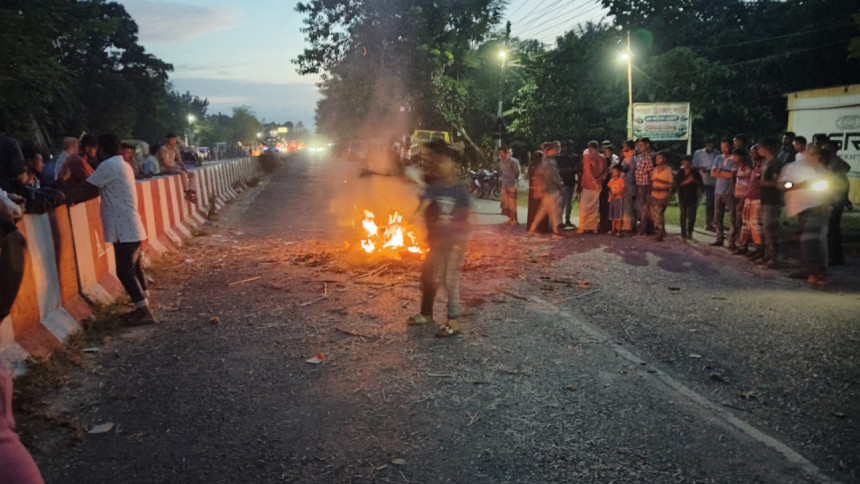When the state fails the dead

They came for the dead man in the afternoon. On Friday, September 5, on the Dhaka-Khulna highway in Goalanda, Rajbari, a mob did the unthinkable. They exhumed the body of Nurul Haque (otherwise known as Nural Pagla), carried it out into the open, and set it on fire. This was not done in shadow or secrecy. It was a public spectacle, a performance of power staged on the asphalt of a national highway.
Traffic slowed. Phones recorded. The smoke that rose was not just from a corpse; it was the smoke of an unwritten but long-held social contract burning to ashes. What does this say about our nation when a body cannot even rest in peace? Are we still living in a modern-day state, or have we become extras in a horror film scripted by zealots?
Nurul Haque was no ordinary man. To some, he was a spiritual guide; to others, a madman who had declared himself Imam Mahdi, an end-times redeemer in Islamic theology. He died on August 23, and was buried in a raised grave within his compound. However, the painting on his grave, and the accompanying banner declaring his self-styled moniker, caused an uproar among certain groups.
This was the spark. Local groups, led by the Imam Parishad, took objection to what they saw as a heretical innovation. They demanded the grave be levelled. The local administration, in a characteristic display of weak mediation, brokered a temporary solution: the family would remove the banner and repaint the grave. But mobs are not interested in negotiation. Their currency is ultimatum, and by September 5, their patience ran out.
What happened next was a chillingly familiar sight in today's Bangladesh. After the Jummah prayers, a gathering at the Goalanda Ansar Club square mutated into a violent assembly. Men with hammers, shovels, and sticks arrived. When organisers asked them to lay down their weapons, it seemed instead to provoke them. The mob turned first on the symbols of the state, vandalising police and UNO vehicles. This was a telling moment. Attacking the state's representatives is a way of testing its strength. That day, the state failed the test.
It is not enough to issue statements. They must demonstrate, through decisive action, that they hold the monopoly on the enforcement of law, and that they will dismantle the mobs, arrest the ringleaders, and protect the vulnerable. For if the state cannot even protect the dead, what hope do the living have?
Then came the march to Nural's darbar or shrine. His followers, who saw spirituality in his madness, tried to resist. Bricks were thrown; fires were lit. The mob scaled walls, looted belongings, and finally, dug up Nural's body and set it ablaze. A follower was hacked to death, and scores were injured. To call this spontaneous violence would be to ignore its true nature. It was a calculated performance, a ritual of domination meant to show that the mob, not the state, holds the power in today's Bangladesh.
In political theory, the state is defined by what Max Weber called its "monopoly on the legitimate use of physical force." The interim government seems to have surrendered that monopoly. Their response to the horror has been a masterpiece of impotence: a condemnation calling the mob incident "inhuman and despicable," a promise of "immediate and tough legal action," and finally a case filed against 3,500-4,000 unidentified people—a number so absurd it casts doubt about the entire legal process. Although 22 people have been arrested in two cases filed so far, as per latest updates, whether this will amount to more than symbolic gestures, with the real culprits or ringleaders brought to justice, is anybody's guess.
The state's failure, both during and after such acts of violence, has been evident on multiple occasions. In fact, on the very day of the Rajbari incident, another mob vandalised a Sufi shrine in Rajshahi. The police response? "There were only five of us. What were we supposed to do?" When the guardians of order admit their irrelevance, the whole concept of a state collapses. We are then left with a state of exception where the law is suspended, and life is reduced to bare life, vulnerable to violence without recourse.
It is worth recalling that Bangladesh was born from a struggle that championed secularism and pluralism. Our constitution promises every citizen the freedom to practise their faith. But what does that promise mean when a man's body can be dug up and burned for the way he was buried?
The term pagla (mad) in South Asia often carries a spiritual weight. It describes those who live outside the boundaries of the ordinary, and are believed to have been touched by a divine madness. From the Bauls of Bengal to the Sufi fakirs, this land has always made space for them. That space is now being erased, replaced by a rigid and unforgiving orthodoxy that admits no dissent, no difference, no mystery.
The mob that burned Nural's body was actually burning our history of syncretism, our tolerance for the eccentric, our commitment to the idea that faith is a matter of the heart, not of violence.
The Padmar Mor area on the Dhaka-Khulna highway is clean now. The traffic moves as if nothing had happened. But once you have seen what happened, it cannot be unseen. The image of that burning body is a ghost that will haunt this nation. It asks us a question we can no longer avoid: what happens when a state fails its most basic duty of protecting the bodily integrity of its citizens, alive or dead?
Each time such an atrocity occurs—the burning of Buddhist temples in Ramu, the ransacking of Hindu homes in Rangpur, the hacking of bloggers—we go through a cycle. We mourn. We express outrage. We demand justice. And then we forget, and move on, until the next horror show arrives.
But this must not be forgotten. The interim government must answer for this. It is not enough to issue statements. They must demonstrate, through decisive action, that they hold the monopoly on the enforcement of law, and that they will dismantle the mobs, arrest the ringleaders, and protect the vulnerable. For if the state cannot even protect the dead, what hope do the living have?
Zakir Kibria is a Bangladeshi writer, policy analyst and entrepreneur based in Kathmandu. He can be reached at zk@krishikaaj.com.
Views expressed in this article are the author's own.
Follow The Daily Star Opinion on Facebook for the latest opinions, commentaries and analyses by experts and professionals. To contribute your article or letter to The Daily Star Opinion, see our guidelines for submission.




 For all latest news, follow The Daily Star's Google News channel.
For all latest news, follow The Daily Star's Google News channel. 

Comments